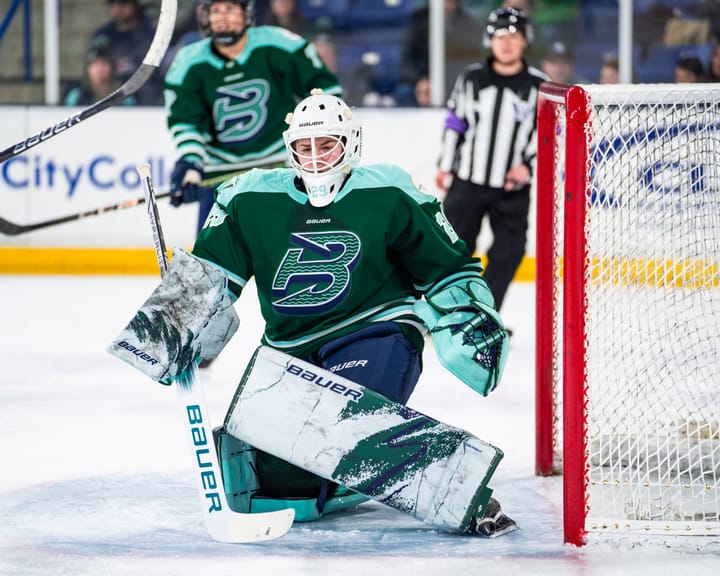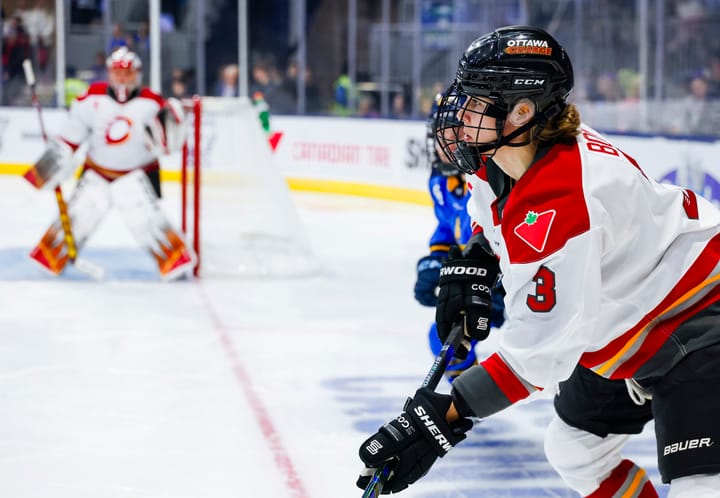Kori Cheverie makes history, joins Ryerson Rams’ coaching staff
Former CWHL player becomes first woman to coach CIS men’s hockey
Kori Cheverie didn't grow up dreaming to be a hockey coach, but she was dreaming when she was announced as one.
The recently retired CWHL player, promoted in August to become the first female coach on the men's side in Canadian Interuniversity Sport's history, was asleep in New Zealand when the news broke.
"There's a big time difference, so when I woke up in the morning to find on my phone missed calls, text messages, emails, Twitter was lightning up," she said. "I thought, 'Well, I guess this is happening.'"
Cheverie, 29, will join Toronto's Ryerson Rams behind the bench as an assistant coach. She'd spent the past three seasons as the team's skating coach and was in New Zealand on a goodwill exchange with Ryerson and the New Zealand National hockey program, one that had an emphasis on growing the game for young girls.
"The past couple of weeks have been pretty hectic, but in a good way," she said. "Everything has been a whirlwind."
She said that she went through all the typical steps one would go through to apply for a job: resume, cover letter, multiple interviews.
Her promotion came within proximity of Dawn Braid's hiring by the NHL's Arizona Coyotes. Braid, also a skating instructor, is the NHL's first full-time female coach.
"The cool thing about being named the first female at the CIS men's level is that, even though I'm hockey specific, I can look to other females like Becky Hammon, Dawn Braid, Barb Underhill with the [Toronto] Maple Leafs -- the list goes on and on," she said. "I'm just being added to an already amazing list of females in the men's game. I look to them [as] role models, seeing how they go about their relationships with the players that they're coaching. I know the game and can teach the game -- I'm not worried about that. The biggest thing I think about is how these guys relate to me -- how we establish a working relationship that I respect and that they respect."
She joins a staff that includes interim head coach Johnny Duco who is taking over for veteran Graham Wise, retired now after 35 years in CIS hockey. Duco was an assistant coach alongside Cheverie the past few seasons.
"Kori and I worked in skate training together the last three years and were able to develop a relationship," said Duco. "I was able to see first-hand the type of person she was and the type of value she could bring to our team. I think she's an excellent skills coach, a great power skating coach -- [all of which] comes from her tremendous hockey background. We've always worked extremely well together.
"I consider myself extremely fortunate to have worked under Graham for four years," Duco said. "He'd never say "work under him," he'd say "work with him" -- that's the type of guy he is. He kept me involved in all the decision-making and made me feel that I had an influence and a voice on the team. With Kori, I see someone like myself at the beginning and I want her to be part of the team. She's already helped with our playbook, our rules, and our expectations for the year. Her voice will definitely be heard."
Cheverie, who leaves the Toronto Furies of the CWHL as their all-time leading scorer, has coaching on her resume but didn't know when or if it would become a reality.
"I never thought that coaching would be my career; I thought that it was something you did on top of your job because that's what all my coaches did," she said. "I wanted to start coaching while I was still a relevant player and I could probably play for two more years, but what's two more years? Where is that going to put me, playing-wise? I wanted to leave the game before it left me. [Ryerson] was an opportunity that I couldn't ignore."
She certainly could have played a couple more years. Cheverie finished second in scoring to Natalie Spooner with the Furies in 2015-16. But there are different concerns for a woman retiring from the women's game than for men in pro leagues like the AHL and NHL.
"It's definitely bittersweet," Cheverie said of her retirement. "I'm happy that I have a role to move into. I might be a little stir-crazy that I can't play but I think being on the bench and in practice and working with the guys is gonna be really fulfilling. Playing at the top level with the best players in the world, it's hard on the body. People say I'm only 29 but I've been playing for 20 years. It's hard to keep up with the Natalie Spooners and Kelly Terrys and the Jenelle Kohanchuks of the world."
Cheverie departs from the CWHL as it heads into its 10th season. The league has made strides in recent years with televised games on Canada's Sportsnet, increased sponsorship deals, an affiliation with the Toronto Maple Leafs, and growing registration in the yearly entry draft. The players, however, are not yet paid to play.
"I wish I could have played [long enough] to see [CWHL players getting paid] but I'll be really happy for the girls when that happens," she said. "They give up a lot of their time -- four nights a week -- and each game day is at least an 8-10 hour commitment. We don't just show up 15 minutes before the game and play.
"I think the league is headed in a really good direction."
One could say the same about CIS.





Comments ()